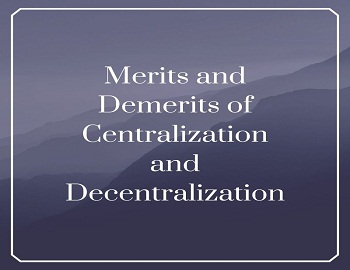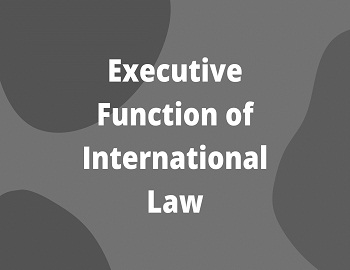Table of Contents
Merits and Demerits of Centralization and Decentralization:
Before discussing the merits and demerits of centralization, it may be pointed out that its merits are the demerits of decentralization and its demerits are the merits of decentralization.
An organization based on the principle of centralization provides for central direction both in the formulation and the execution of policies and programmes. It has merits as well as demerits.
Merits of Centralization:
(1) Brings Better Coordination- In order to develop uniform policies and practices, a centralized organization is necessary. It can bring better coordination among the various units and levels of an organization.
(2) Easier to identify key Person/Persons-In centralization, authority being concentrated at the top level, it is easier to identify the key person or persons who exercise the real authority.
(3) Easier fixation of Responsibility- Since in a centralized administration, the key person/persons stand identified, it becomes easier to fix responsibility in case of a default or a lapse or error.
(4) Duplication in Administrative Organization can be Avoided- In a centralized organization, there is little fear of duplication in the administrative organization since authority is vested in a few persons at the top.
(5) Full utilization of Personnel and Equipment- According to Mervin Kohan, “The centralized organization develops a corporate personality by enabling the full utilization of the personnel and the equipment in the organization”. Centralized authority can take quick and timely decisions and enforce these firmly.
Demerits of Centralization:
(1) Centralization does not allow the development of the second line of executives. In a centralized organization, if an emergency arises at the unit level, its solution becomes difficult for the unit itself since it does not enjoy the required decision-making authority.
(2) In a centralized organization, the local needs of the organization cannot be understood from the right perspective. It hinders the utilization of local resources, and hence often fails to meet local needs.
(3) In a centralized organization, delegation is practised in a very limited way. Its scope is always kept limited. There is minimal use of delegation of authority because the real authority always lies with the top level of the organization.
(4) The work in the organization suffers unnecessary delays because subordinates have to approach the superiors for taking even minor decisions.
(5) Centralization results in the low morale of the subordinates. They do not develop a sense of being important, useful and active members of the organization.
Merits of Decentralization:
In a decentralized organization, the lower levels of the organizational hierarchy enjoy considerable decision-making authority. Following are the merits of decentralization-
(1) More Responsive- Decentralized makes an organization more responsive to the needs of the people. It can understand and assess the real problems and make decisions for their effective solution.
(2) Unduly Big Burden on the Top Management is Avoided- The higher levels of an organization share their authority with the lower levels of the organization. In the process, the top levels deal with only very important matters, whereas the lower levels are left free to tackle less important issues.
(3) Encourages Innovations- Decentralization encourages innovations. It welcomes creative ideas and new techniques recommended by the lower levels of an organization. It encourages a sense of participation and enterprise among the lower levels also.
Reviewing these merits, Louis A. Alley observes that decentralization helps to-
(I) Ease the burden of the top executive.
(II) Facilitate diversification.
(III) Make possible decisions at the scene of action for effective and fruitful delivery of goods and services.
(IV) Encourage the development of meaningful talents.
(V) Improve motivation of the personnel working in the organization.
Demerits of Decentralization:
Apart from various advantages, there are also some drawbacks of Decentralization-
(1) Dispersed authority and geographical distances create problems in the way of an effective communication and control system in the organization.
(2) It gives rise to the problem of coordination. It is very difficult to introduce an effective system of coordination both at policy-making and policy-implementation levels.
(3) It leads to overlapping and duplication of efforts.
(4) It essentially results in higher costs of operational activities.
Conclusion- Centralization and decentralization are important principles to be followed at the time of the formation of an organization. They deal with authority distribution within an organization. Each has its own merits and demerits. Both have to be combined in a balanced way so as to keep the demerits of each under control but at the same time cash on their merits.









Comments (No)